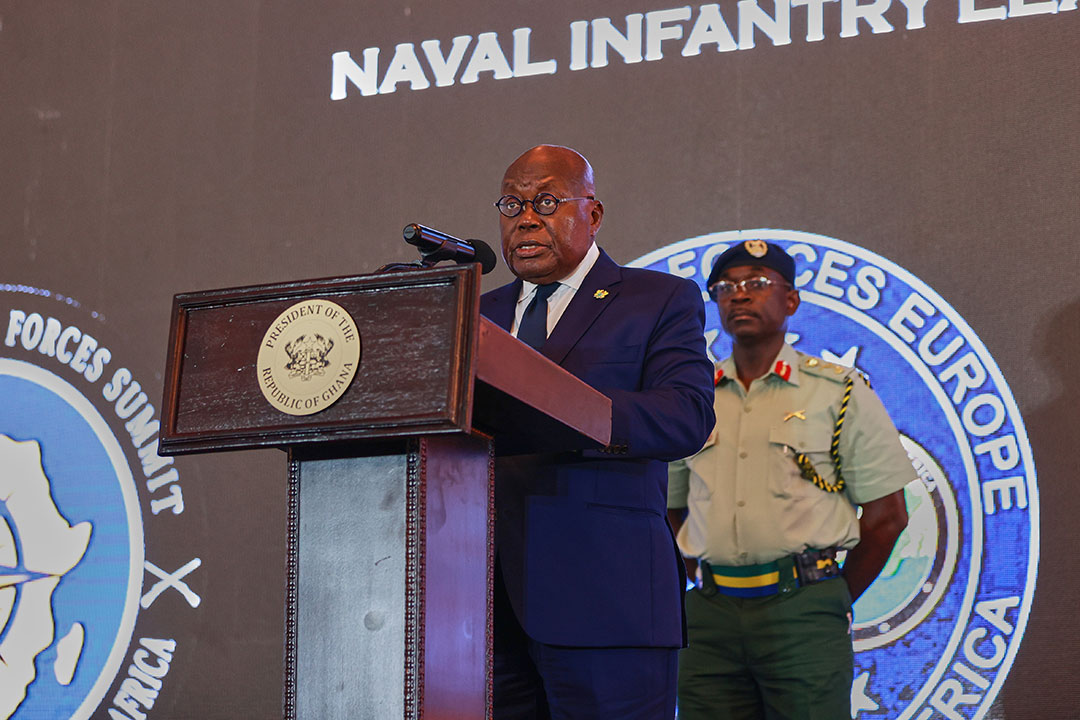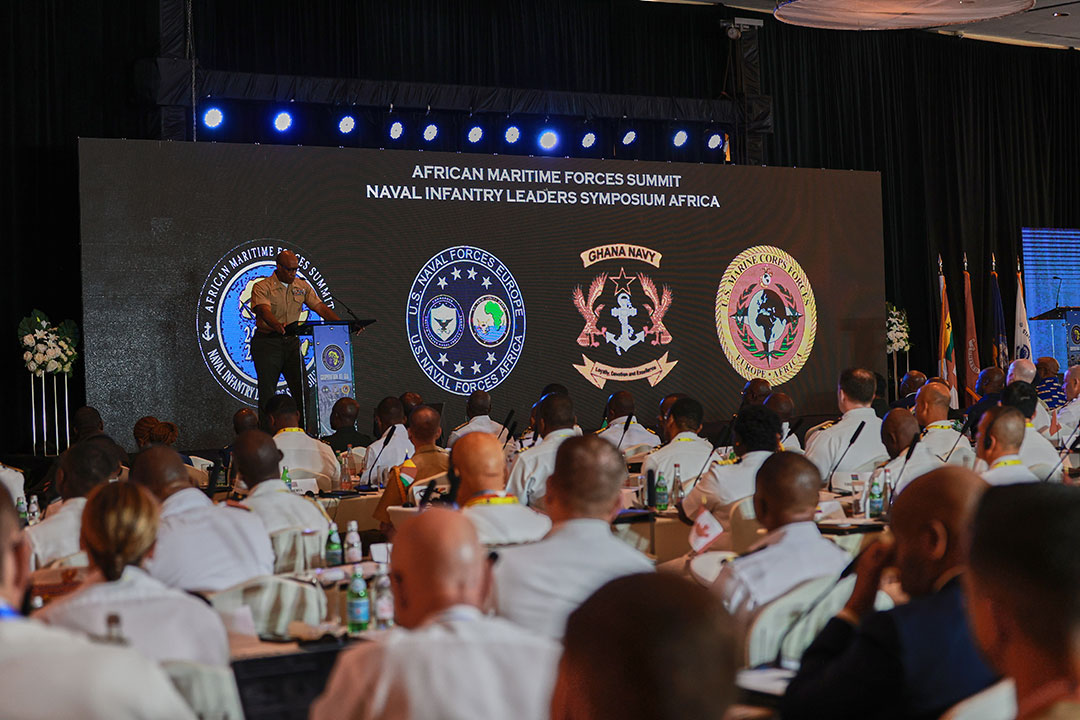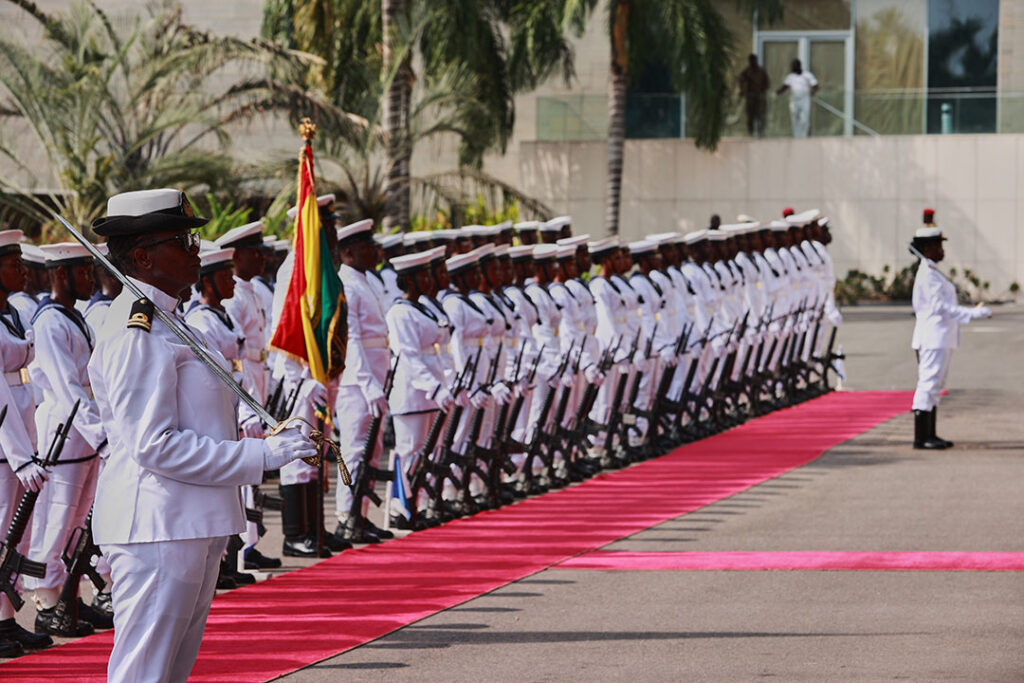ADF STAFF
The joint African Maritime Forces Summit and Naval Infantry Leaders Symposium-Africa brought naval and coast guard leaders from 30 African countries and nearly a dozen partner nations for a week of high-level discussions. Attendees focused on sharing best practices and insight on how to safeguard coastal waters, littoral zones and inland waterways from a range of criminal activity.
In one of the largest gatherings of its type, the conference room in Accra, Ghana was awash in crisp white uniforms worn by admirals and generals from across the continent. The three days of events included presentations by security experts from Africa, Europe, North America and South America. At the heart of the discussions: how to bring the continent’s combined military might to bear against the many shared issues arising in Africa’s maritime environment.
“The existing mechanisms for international cooperation are a process that is working, but there is room for improvement as maritime crimes still exist within the Gulf of Guinea,” Rear Adm. Patrick Effah, Nigeria’s director of Naval Intelligence, told the gathering. “The ability to respond appropriately is an issue that needs to be looked at.”
Through mechanisms such as the Yaoundé Protocol and the Djibouti Code of Conduct — two multilateral agreements designed to combat piracy, illegal fishing and other maritime crimes — African nations share information about illicit activity in coastal waters. The agreements can fall short, however, when it comes to turning that information into action, Effah said.
“Several challenges are undermining the optimal performance of the Yaoundé Architecture,” Effah told ADF in an interview. “Key among them is the issue of staffing. Signatories are supposed to send representative to the staff, but we are not seeing that.”
Navies and coastal forces confront an array of challenges, including illegal, unreported, and unregulated (IUU) fishing, piracy and terrorism, environmental degradation, and drug trafficking. The issues cross international boundaries within the continent, creating enforcement problems.

Projects such as the Gulf of Guinea Combined Maritime Task Force, launched in 2023, could resolve some of those enforcement issues by creating a joint force that would respond in a timely manner across international boundaries to maritime crimes, Effah said. At this point, the task force remains more plan than reality, however.
Drug traffickers use West Africa as a transit hub between South America and Europe, posing a challenge that demands a global response, according to experts. Through its Orion campaign, Colombia has built international capacity on both sides of the Atlantic to monitor and interdict drug trafficking between the continents, according to Brig. Gen. Alfonso Hernandez of Colombia.
Since 2018, the Orion campaign has brought together 42 countries operating in maritime, near-shore, and inland waterways to disrupt drug trafficking. Senegal and the Yaoundé-based Inter-Regional Coordination Center are the only African participants to date. The campaign has made 4,500 arrests and captured more than $42 billion in illegal drugs, Hernandez told the gathering.
“Cooperation is very important,” Hernandez said. “Without it, we would never have been able to identify the perpetrators of these crimes.”
At least 12 African nations have joined two international mechanisms designed to expand maritime domain awareness by tracking cargo vessels as they move around the world. For African nations, the Italy-based Virtual Regional Maritime Traffic Centre and Trans Regional Maritime Network share unclassified information about ship movements in the Gulf of Guinea, Red Sea and eastern Indian Ocean — three regions with a history of piracy and attacks on shipping.

“Knowing what is going on at sea is the basis, but it is not enough,” Rear Adm. Massimiliano Lauretti of the Italian Navy told the group. Cooperation and interoperability play crucial roles in nations’ ability to act on the information they receive, he added.
Multinational efforts in the Gulf of Guinea have reduced piracy in recent years, but much remains to be done to improve maritime security in Africa’s coastal waters, Ghana’s Chief of Naval Staff Rear Adm. Issah Yakubu said. Among other things, nations must create legal frameworks to punish pirates, drug traffickers, and other maritime criminals. Without such actions, security efforts go to waste, he added.
“It’s a national obligation,” Yakubu said. “Our scorecard here leaves a lot of room for improvement.”
In many ways, Ghana has become a model for the future of Africa’s maritime security. In recent years, the country has added 20 new vessels to its naval operations and is building a new Navy base in its western region. Ghana is becoming a key player in regional security, but collaboration remains paramount, President Nana Akufo-Addo told the gathering in his keynote address.
“Transnational crimes not only threaten peace and security. They also come at great cost to our national economies,” Akufo-Addo said. “By working together and sharing intelligence, we can safeguard our maritime domain. No nation can afford to do it alone.”

